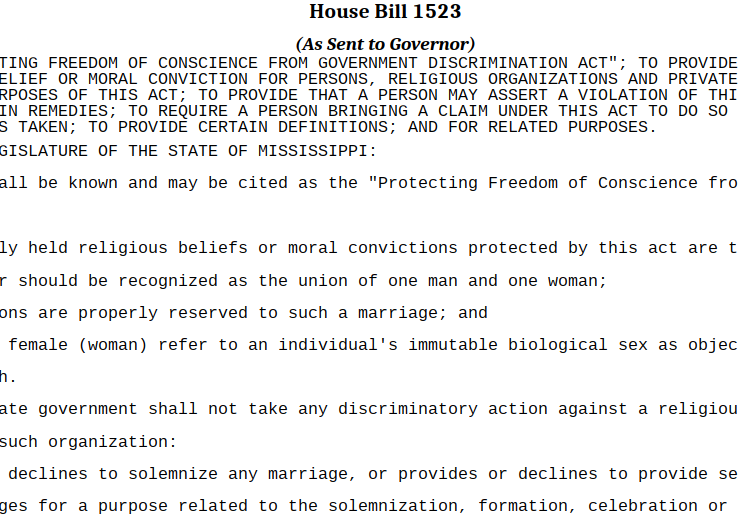A Student’s Opinion on House Bill 1523
May 9, 2016
Editor’s Note: Dajah Carter is a senior at MSMS and contributed this opinion.
The First Amendment in the Bill of Rights is the freedom from and freedom to religion. The exact wording is, “Congress shall make no law respecting an establishment of religion, or prohibiting the free exercise thereof.” The 10th Amendment states “The powers not delegated to the United States by the Constitution, nor prohibited by it to the states, are reserved to the states respectively, or to the people.” This means that the states have the right to decide how to handle situations not explicitly listed in the Constitution. I have cited these two amendments because of a recent bill turned law in Mississippi: House Bill 1523.
What exactly is HB-1523? I’ve heard it called the “Anti-Gay” law, “Legalizing Discrimination” law and even the “Religious Freedom” law. HB-1523 is a law that allows discrimination against a certain group of people. The people who are allowed to do the discriminating are people with a “sincerely held religious beliefs or moral conviction.” Section 3 of HB-1523 says that these people are able to refuse service to people that challenge the notion that
“(a) Marriage is or should be recognized as the union of one man and one woman;
(b) Sexual relations are properly reserved to such a marriage; and
(c) Male (man) or female (woman) refer to an individual’s immutable biological sex as objectively determined by anatomy and genetics at time of birth.”
Before, I brought up our 1st and our 10th amendment rights. This is because this law goes directly against those. It is unconstitutional to enact a law that would allow for one person to discriminate against the other for the purpose of exercising their religion. I brought up the 10th amendment because federal courts have already ruled that same sex marriage is legal in every state. The state does not have the right to make a law that is nothing more than a loophole for people who have an issue with same sex marriage.
HB-1523 is a law that will be enacted starting July 1, 2016. It will allow for people to refuse service to people just trying to live their lives. The bill includes examples of some services that can be refused. Most services listed seemed to relate to marriage in one way or another, but it also had to explicitly state that that specific subsection could not be construed in order to deny any person “emergency medical treatment necessary to cure an illness or injury as required by law.” This section had to be included because the possibly of discrimination is practically limitless due to the vague wording and encompassing terms. People a part of the LGBT+ community lose rights that are nothing less than rights. Everyone has the right to go out and have a meal, everyone has the right to get married, and everyone has the right to seek any kind of counseling they need. This law thrusts us directly in the past by giving some people the right to say that “no, these people aren’t allowed to have the same rights I have.”
One thing that makes me sick to my stomach was how many sections of this law started with the words, “The state government shall not take any discriminatory action against…” This statement usually ended with a person taking advantage of this new found right or a religious organization. It’s sickening that House Speaker Philip Gunn, the man who authored this bill could use the world “discrimination” as many times as he did without stopping and wondering if what he was drafting was discrimination itself. It’s sickening that this bill was passed by not only the House of Representatives or the Senate, but that it was passed by both branches of legislature and Governor Phil Bryant. They either believed that this law will encompass the views of most Mississippians, or did not care that it doesn’t.
The Biloxi City Council has already requested that this bill be repealed. Entertainers have canceled scheduled appearances in the state as protest. New York’s governor has even issued a travel ban to state employees for non-essential purposes. This law has not been received well, and for good reason. Mississippi is a state that is viewed to be stuck 50 years in the past, and when we pass bills like this, aren’t we showing the rest of the world we are?








